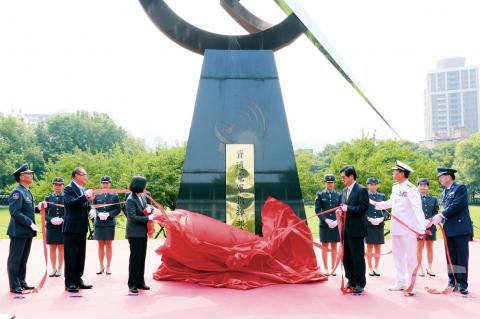The threat from state-sponsored cyberattacks on the nation’s digital infrastructure, including those directed by Beijing-affiliated groups, has increased in sophistication and severity over the past year, the Department of Cyber Security said yesterday.
Last year, Chinese hackers mounted 288 successful cyberattacks on the government’s systems, or 80 percent of the total of 360 successful attacks that the department discovered, department Director Chien Hung-wei (簡宏偉) said.
Each month, the government’s systems are subjected to anywhere between 20 million and 40 million attacks, in addition to billions of probing actions made by hackers looking for weaknesses, he said.

Photo: courtesy of Military News Agency
These actions are initiated by hackers from around the world, though groups based in China are believed to be involved in many of them, Chien said.
The overwhelming majority of cyberattacks are level 1 or level 2 events that result in unauthorized changes to Web pages or other minor damage, he said.
However, the government’s digital domains suffered 10 level 3 incidents, which might have compromised personal data stored on the affected systems, he said.
While there were no successful level 4 attacks — the highest threat level — against the nation’s infrastructure, Chinese hackers had improved the success rate of their attacks, he said.
“The increasing precision of Chinese attacks is a matter of concern for this department,” Chien said.
Hackers route their attacks through servers in the US, Russia, EU member states and other nations, which makes pinpointing an attack’s point of origin difficult, he said.
However, the department is able to identify specific patterns, traits and other modes of operation that are associated with China-sponsored hackers, including the presence of certain characters or styles of coding used in hacking tools, he said.
Hackers from China, North Korea and Russia have been highly active, and Taiwan often serves as a testing ground for new hack tools or techniques before their deployment against targets in other nations, he said.
As a result, foreign governments have expressed an interest in gaining access to the information the department has collected on cyberattacks directed against Taiwan, he said.
The department is overseeing the government’s efforts to develop a system of defense to shield its core computer systems, infrastructure and sensitive data from cyberattacks, Chien said.
The defensive system would involve building up defenses at each of the government’s Web portals and each of the office domains connected to them, he said.
Furthermore, government offices need to communicate with each other and share information about cyberattacks to coordinate their security efforts and discern emerging threats, he said.
An academic, on the day of being nominated a Cabinet official, had received an e-mail with an embedded virus that was designed to penetrate the government’s internal networks, said an official, who asked not to be named.

AIR SUPPORT: The Ministry of National Defense thanked the US for the delivery, adding that it was an indicator of the White House’s commitment to the Taiwan Relations Act Deputy Minister of National Defense Po Horng-huei (柏鴻輝) and Representative to the US Alexander Yui on Friday attended a delivery ceremony for the first of Taiwan’s long-awaited 66 F-16C/D Block 70 jets at a Lockheed Martin Corp factory in Greenville, South Carolina. “We are so proud to be the global home of the F-16 and to support Taiwan’s air defense capabilities,” US Representative William Timmons wrote on X, alongside a photograph of Taiwanese and US officials at the event. The F-16C/D Block 70 jets Taiwan ordered have the same capabilities as aircraft that had been upgraded to F-16Vs. The batch of Lockheed Martin

GRIDLOCK: The National Fire Agency’s Special Search and Rescue team is on standby to travel to the countries to help out with the rescue effort A powerful earthquake rocked Myanmar and neighboring Thailand yesterday, killing at least three people in Bangkok and burying dozens when a high-rise building under construction collapsed. Footage shared on social media from Myanmar’s second-largest city showed widespread destruction, raising fears that many were trapped under the rubble or killed. The magnitude 7.7 earthquake, with an epicenter near Mandalay in Myanmar, struck at midday and was followed by a strong magnitude 6.4 aftershock. The extent of death, injury and destruction — especially in Myanmar, which is embroiled in a civil war and where information is tightly controlled at the best of times —

Taiwan was ranked the fourth-safest country in the world with a score of 82.9, trailing only Andorra, the United Arab Emirates and Qatar in Numbeo’s Safety Index by Country report. Taiwan’s score improved by 0.1 points compared with last year’s mid-year report, which had Taiwan fourth with a score of 82.8. However, both scores were lower than in last year’s first review, when Taiwan scored 83.3, and are a long way from when Taiwan was named the second-safest country in the world in 2021, scoring 84.8. Taiwan ranked higher than Singapore in ninth with a score of 77.4 and Japan in 10th with

SECURITY RISK: If there is a conflict between China and Taiwan, ‘there would likely be significant consequences to global economic and security interests,’ it said China remains the top military and cyber threat to the US and continues to make progress on capabilities to seize Taiwan, a report by US intelligence agencies said on Tuesday. The report provides an overview of the “collective insights” of top US intelligence agencies about the security threats to the US posed by foreign nations and criminal organizations. In its Annual Threat Assessment, the agencies divided threats facing the US into two broad categories, “nonstate transnational criminals and terrorists” and “major state actors,” with China, Russia, Iran and North Korea named. Of those countries, “China presents the most comprehensive and robust military threat